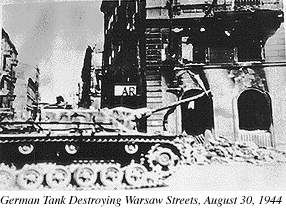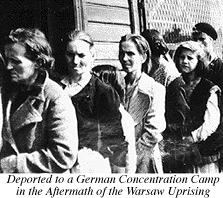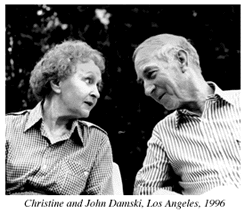JOHN DAMSKI TELLS HIS STORY (Conclusion)
JOHN DAMSKI: The next day people came around asking for helpers for a makeshift hospital they were setting up in the basement of the Foreign Ministry building. They took Christine, a few other women, and me. We stayed there a couple of days, until a fellow came along whom
 I'll remember always: an S.S. man, tall, cross-eyed, carrying a basket loaded with fine crystal glassware, obviously stolen; the Germans were looting all the houses.
I'll remember always: an S.S. man, tall, cross-eyed, carrying a basket loaded with fine crystal glassware, obviously stolen; the Germans were looting all the houses.
He looked at me and said, "You Polish swine, why are you looking at me like that?"
I replied in German, "I'm sorry, but I'm not Polish."
"Oh, forgive me. What are you doing over here?"
I told him my businessman story, that I got caught by the Uprising. Then he said, "Look, everyday at 4 o'clock we take our packages for Germany to Jablonna." They couldn't send anything to Germany directly from Warsaw because of the fighting, so they drove their stolen goods about twenty-five or thirty miles out of town, filled a big truck with the loot, and sent it from there to Germany.
"You and your wife can come with us tomorrow," he said. Well, it was a chance to get out. The next day at 4 o'clock they showed up, drunk. "Come on!" they yelled. They gave me a bottle, and I had to have a drink too. Then they warned us, "When the truck turns the corner at this particular intersection, duck as low as you can. They're going to shoot." They explained that the partisans' guns were aimed at a certain height; if we got down, they couldn't hit us. They made this trip everyday, and had it figured out. The partisans could hear us as our truck came down the street, and they were ready. As we went by they shot twice, but just as they said, the bullets went over our heads, and we got out safely.
 They made a stop about fifteen miles from Warsaw, in a place called Bielany. Everyone in the village was scared; they didn't know what was going on in Warsaw. They had set up beds in the church basement and were all staying there. We took shelter with them for the night. The next day we decided to leave the Germans and strike out on our own.
They made a stop about fifteen miles from Warsaw, in a place called Bielany. Everyone in the village was scared; they didn't know what was going on in Warsaw. They had set up beds in the church basement and were all staying there. We took shelter with them for the night. The next day we decided to leave the Germans and strike out on our own.
We were walking through the woods when we came upon a large villa; it was a vacation resort for the city employees of Warsaw. Everybody there wanted to know our story--how we got out of Warsaw. Some of them thought we were traitors, not because we didn't stay to fight, but because I was not in favor of the Uprising. I said that it was unwise, in fact suicidal, for the Poles to attempt the Uprising; we didn't stand a chance against the Germans; we should let the Russian Army finish them off.
We stayed on at that villa for a week or two. Every night we had to stand watch in the surrounding forest; I couldn't figure out why. Then one day, in the daytime, someone called to me, "Mr. Damski! Come quick! Germans are coming! Try to talk to them." They were a group of German officers--medical doctors--who were looking for a place to put a hospital. They were all from Bavaria, from the regiment that had retreated from Stalingrad. Hitler had blocked the promotions in that division because they had given up the fight. They said something to me about "Polish bandits," meaning the partisans. I said I didn't consider them to be outlaws, just fighters from the Polish Home Army. We talked for awhile, and then they left.
After they had gone, I found out why the people in the villa had wanted me to stall the Germans with this conversation: they were operating a secret hospital for Polish partisans hiding in the nearby forest. While I was talking to the Germans in the front, they were taking the wounded partisans out the back door. A few days later one of the doctors came back, saying that they were organizing the collection and delivery of local farm produce, and they needed a translator. So everyday I went to their military hospital to translate for the people working for the agricultural department. And everyday they gave me a big can of soup, that I brought back to the villa for everyone to eat.
One day, Christine was walking down the road when a car stopped, and a guy jumped out. "Mrs. Damski, I'm looking for your husband." He was an inspector for all the fruit and vegetable businesses in the Warsaw district; I knew him from my last job there. He explained that Warsaw had a population of over two million people, cut off now from the farmers' production. And what do you do with all the vegetables in the fields? Let them rot? He wanted me to organize a fruit and vegetable wholesale operation.
So Christine and I moved to the little town of Ozarow, and there I organized a wholesale business which grew very quickly; we employed one hundred nineteen people, and at peak time we were selling as much as four thousand tons of vegetables.
 I could get all the vehicles I needed from the Germans; we had six large trucks with trailers. Every month we loaded between twelve and fifteen railroad cars with vegetables that were shipped to Hamburg, to Brussels--everywhere. There had never been such a wholesale business in all of Poland before; it was a terrific success.
I could get all the vehicles I needed from the Germans; we had six large trucks with trailers. Every month we loaded between twelve and fifteen railroad cars with vegetables that were shipped to Hamburg, to Brussels--everywhere. There had never been such a wholesale business in all of Poland before; it was a terrific success.
In January, 1945 the Russians entered Ozarow, and that was the happiest moment; we had survived.
I did the right thing--no, I don't mean, the right thing--it was what everyone should have done. Certainly there were Poles who didn't care about what happened to the Jews, but there were others who did. That one hundred thousand Jews survived in Poland must have meant about one million people helping them. In our case, at least a dozen people knew my wife was Jewish. I have an inner sense of satisfaction for what I did, and that is my reward. And, I have a wonderful wife.
John Damski gave this interview in his home in Los Angeles, California,May 14, 1988.
Return to:
 They made a stop about fifteen miles from Warsaw, in a place called Bielany. Everyone in the village was scared; they didn't know what was going on in Warsaw. They had set up beds in the church basement and were all staying there. We took shelter with them for the night. The next day we decided to leave the Germans and strike out on our own.
They made a stop about fifteen miles from Warsaw, in a place called Bielany. Everyone in the village was scared; they didn't know what was going on in Warsaw. They had set up beds in the church basement and were all staying there. We took shelter with them for the night. The next day we decided to leave the Germans and strike out on our own.
 I'll remember always: an S.S. man, tall, cross-eyed, carrying a basket loaded with fine crystal glassware, obviously stolen; the Germans were looting all the houses.
I'll remember always: an S.S. man, tall, cross-eyed, carrying a basket loaded with fine crystal glassware, obviously stolen; the Germans were looting all the houses.
 I could get all the vehicles I needed from the Germans; we had six large trucks with trailers. Every month we loaded between twelve and fifteen railroad cars with vegetables that were shipped to Hamburg, to Brussels--everywhere. There had never been such a wholesale business in all of Poland before; it was a terrific success.
I could get all the vehicles I needed from the Germans; we had six large trucks with trailers. Every month we loaded between twelve and fifteen railroad cars with vegetables that were shipped to Hamburg, to Brussels--everywhere. There had never been such a wholesale business in all of Poland before; it was a terrific success.